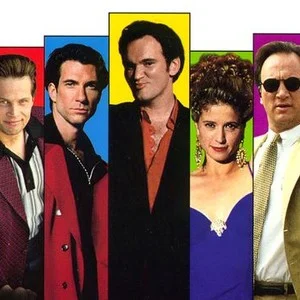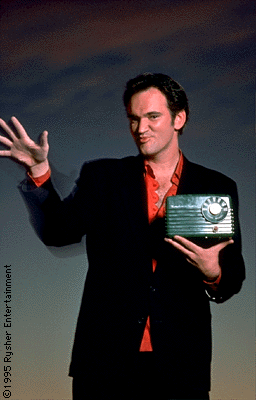Mister Destiny Meets Johnny Destiny My World of Flops Case # 135 /My Year of Flops #32 Destiny Turns on the Radio (1995)
Choose your fighter!
In a Facebook group I belong to someone complained that while they liked Quentin Tarantino as a filmmaker, they were super put off by the way he suddenly seemed to be everywhere, talking up Once Upon a Time in Hollywood and discussing future projects and possible retirement from filmmaking, to the point of being done with him as a filmmaker and human being.
The other members of the group semi-curtly explained that what Tarantino was doing is known in the “biz” as “promoting his new movie”, a mysterious and little-understood process where the actors and the director of an expensive, high-profile new film go anywhere they possibly can to encourage audiences to see said movie, multiple times ideally, so that the movie can turn a healthy profit and help the careers of everyone involved.
This burst of self-promotion surrounding the release of a controversial new movie is less some strange aberration born of Tarantino’s incessant need to sell himself than the standard way pretty much every movie is packaged and sold and has been for a very long time.
It’s easy to understand how people can be put off by Tarantino’s shtick and Stan Lee-level genius for self-promotion but the media blitz surrounding Once Upon a Time in Hollywood is but a faint echo of the mania that surrounded the release of his 1994 breakthrough hit Pulp Fiction.
Pulp Fiction wasn’t just a zeitgeist-capturing, paradigm-shifting sleeper smash. It was a goddamn pop culture phenomenon. It turned its auteur into a rock star. Impressionable fanboys like the eighteen year old me had Quentin Tarantino posters adorning their walls in college. The night I lost my virginity in a co-op in Madison, Wisconsin I had watched Pulp Fiction on videocassette with the woman who would rob me of their all-important sexual purity just a few hours before the blessed even took place.
I wanted to be Quentin Tarantino when I grew up. I wanted to write movies like Quentin Tarantino. I wanted to direct movies like Quentin Tarantino. I wanted to awkwardly shoe-horn myself into my movies as an actor out of vanity and myopic narcissism like Tarantino. I wanted to be cool and hip and matter the way QT did. I wanted kids to grow up worshipping me the way I prostrated myself at Tarantino’s hipster altar.
Tarantino was so hot in the mid 1990s that the adorably ill-fated metaphysical crime comedy Destiny Turns on the Radio was sold largely on the basis of Tarantino’s presence not as a writer, director or even producer but rather as an actor. Destiny Turns On the Radio made audiences an offer they enthusiastically refused. It said, “Hey, you know that big-headed doofus whose film appearances you reluctantly tolerate because they’re part of the grand gestalt of the wonderful movies he writes and directs? Well we’ve got him in a small but crucial role in a new movie but he had NOTHING to do with the script or direction, both of which are egregiously terrible. Intrigued?”
Tarantino doesn’t have a very big role in Destiny Turns on the Radio. He’s probably only onscreen for about ten minutes but his miscasting would be enough to single-handedly sink the film even if every other element wasn’t equally misguided and staggeringly wrong.
In Destiny Turns on the Radio Tarantino plays Johnny Destiny, a magical hipster who isn’t just supposed to be cool: he’s supposed to embody coolness. He’s supposed to radiate coolness from every pore.
Steve McQueen, James Dean, Jimi Hendrix, Elvis Presley and Miles Davis were never as cool as Johnny Destiny is supposed to be.
Johnny Destiny isn’t just the heppest of all hep cats. Dig it, man: that cat is magically hip rather than tragically hip. He straight up emerged naked from the pool at the Marilyn Motel in Las, Vegas Nevada (can you dig which famous broad the Marilyn is named after? I knew you could!) covered with cosmic energy and jolts of electricity, a strange, enigmatic visitor from another realm who embodies the essence of luck or destiny or some such bullshit.
Tarantino isn’t playing a character so much as his bloated self-image come to life. He’s the soul and spirit of Destiny Turns on the Radio, a trickster God with a retro Elvis swagger who embodies the poignant miscalculation at the heart of the film.
Every time you see Johnny Destiny onscreen you’re supposed to gasp in delight and appreciation and think “Wow, he is so cool!” Quentin Tarantino is cool, in the sense that he’s written and directed a bunch of great films and has awesome, weird, interesting taste and does cool shit like champion obscure filmmakers. But he’s also a giant-headed motormouth dork. Destiny Turns on the Radio desperately needs Quentin Tarantino, icon of cool. Instead it gets Quentin Tarantino, giant-headed motormouth dork.
It’s easy to see why playing the coolest, hippest, most powerful hep cat to hit Vegas since Elvis might have appealed to Tarantino’s ego. Just about the only thing they could have done to make it more appealing to the multiple Oscar winner would be to have his character spend an hour judging a “Sexy Feet” contest.
Matthew Stone and Robert Ramsey wrote roles the sexiest, most talented and charismatic actors in the history of film wouldn’t be magnetic enough to play convincingly, then cast the low-wattage likes of Nancy Travis, Dylan McDermott and Quentin Tarantino, thespian, in those roles.
McDermott, or possibly Dermot Mulroney, is woefully miscast as Julian Goddard, a “sexy” bank robber who escapes from prison and returns to his old stomping grounds at the Marilyn Motel with an eye towards retrieving the money from the heist and then leaving town with the great love of his life, “sexy” chanteuse Lucille (Nancy Travis).
If you’re thinking, “Huh, I didn’t know the actress from Becker and Last Man Standing could sing” you’re right! She can’t sing. Not being able to sing should have cost Travis the role of a sexy singer so explosively gifted that her talent and incredible magnetism are impossible to deny but not as much as not being sexy.
Travis is a lovely woman but Destiny Turns on the Radio needs something much, much more than that. It needs a goddamn human Jessica Rabbit. It needs Michelle Pfeiffer in The Fabulous Baker Boys. It needs Lauren Bacall or Rita Hayworth. Instead it gets what feels like a fifth or sixth choice in Travis, who exudes none of the danger, glamour and mega-watt sensuality the role angrily demands.
The hot-tempered and lustful Julian wants to skip town with the songbird of his, and everyone else’s dreams. Unfortunately she’s involved with casino boss Tuerto (James Belushi) who is introduced singing “Viva Las Vegas” like Elvis, a subtle and artful way of conveying that the movie takes place in Las Vegas AKA Sin City AKA The City of Brotherly Love AKA The Big Apple AKA The Windy City That Never Sleeps.
Why does it take place in Vegas? Cause it’s Vegas, baby! Vegas is cool, or at least twelve year old boys think Vegas is cool and Destiny Turns on the Radio’s conception of cool is stuck permanently somewhere deep in middle school. It thinks it’s cool in a Pulp Fiction, French New Wave, Elmore Leonard fashion when it’s really the cinematic equivalent to a retro chain restaurant like Ed Debevic’s.
Johnny Destiny stole the loot from the big heist when he emerged out of a magical pool naked but maybe he will return to the fantastical world from which he emerged if the Marilyn fixes up its pool so that it can once again serve as an entryway from our world to another.
That might sound really stupid or really pretentious but it plays much worse. Meanwhile Lucille’s pushy agent (a young David Cross, doing essentially an obnoxious Mr. Show character) cynically appeals to the record-buying public’s famous love for softly maternal, middle-aged lounge singers to try and snag his client a record deal with Vinnie Vidivici (Allen Garfield) if she can stay out of trouble long enough.
Lucille and Julian need to be the two sexiest people alive, put on earth exclusively to fuck and inspire feverish lust. They need to be Nicolas Cage and Laura Dern in Wild at Heart. Instead we have a sitcom mom and a cop show dude with zero romantic or sexual chemistry woefully miscast as the sexiest sex-havers in the history of sex.
How bad and unconvincing are Travis and McDermott as the world’s greatest, sexiest lovers? I actually found myself rooting for James Belushi. James Belushi! Nobody roots for James Belushi (even James Belushi!), particularly when he’s playing the bad guy.
In many ways Destiny Turns on the Radio is a typical Tarantino knockoff, an over-written, eclectically cast crime comedy that goes overboard on attitude and empty posturing in a doomed attempt to mask its fundamental emptiness.
Tarantino knock-offs draw extensively and shamelessly from hardboiled fiction but Destiny Turns on the Radio is noticeably soft-boiled. It’s largely and refreshingly devoid of the stylized violence, percussive and pervasive profanity, drug use and sexuality common in this most disreputable of subgenres.
This isn’t The Boondock Saints but rather a dopey fantasy about a magical pool.
Destiny Turns on the Radio is soft and quirky and romantic where most films that would not exist without Tarantino’s influence are nasty, shocking and “adult” in the most juvenile possible fashion. That would be refreshing if its conception of love and romance wasn’t so surreally stupid.
I do not want to unfairly single out Tarantino and Travis for not being the explosively charismatic, magnetic performers their impossible roles angrily demand. Dylan McDermott is just as wildly inadequate in a role that calls out for the movie star magnetism of Marlon Brando or a young John Travolta or Mickey Rourke in his radiant, beautiful prime. Instead we get a C-lister I’m still not entirely convinced isn’t actually Dermot Mulroney.
In some ways Destiny Turns on the Radio represents an atypical example of the kind of talky, “cool” crime comedies that sprung up like rashes in the aftermath of Pulp Fiction’s success. One thing it has in common with other Tarantino knock-offs, however, is being fucking terrible, the absolute worst.
Destiny Turns on the Radio cast Quentin Tarantino as a magic man, luck and coolness and cinema personified but the magic that he possessed and continues to possess as a filmmaker and storyteller did not extend to his acting. This thorough embarrassment only served to further underline that Tarantino’s destiny lie behind the camera, not in front of it.
Failure, Fiasco or Secret Success: Failure
Support independent media, get access to patron-only content and help ensure a robust present and future for the Happy Place by pledging over at https://www.patreon.com/nathanrabinshappyplace
OR, preferably, pre-order an autographed copy of the awesome forthcoming Weird Accordion to Al book over at https://make-the-weird-accordion-to-al-book-a-ridiculous-r.backerkit.com/hosted_preorders









